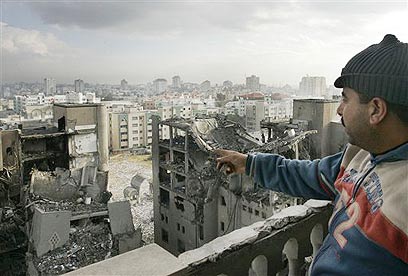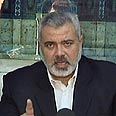
Gaza: Israel strikes Haniyeh's office, smuggling tunnels
Powerful airstrikes target government buildings, including office of Hamas PM; smuggling tunnels under the Gaza-Egypt border also hit; Palestinian medic killed during missile strike east of Gaza City. Meanwhile, two Qassams land in Negev; no injuries
Operation Cast Lead enters fifth day: Israeli warplanes continued to unload bombs on targets in Gaza early Wednesday. Powerful airstrikes caused Gaza City's high-rise apartment buildings to sway and showered streets with broken glass and pulverized concrete. Israel's ground forces on Gaza's border also used artillery for the first time.
Two Qassam rockets fired from northern Gaza Wednesday morning landed in the Sha'ar Hanegev Regional Council. There were no reports of injury.
The Air Force pounded smuggling tunnels under the Gaza-Egypt border, setting off a huge explosion in a fuel tunnel, witnesses said, as other aircraft hit Hamas positions in Gaza City. No casualties were reported.
The military said government buildings were hit, including an office of Hamas Prime Minister Ismail Haniyeh. Over the past few days the Israeli Air Force has targeted several Hamas government buildings, including the Islamist group's finance and foreign ministry buildings.
The IDF Spokesperson's Office said Haniyeh's office served as a "center for planning, supporting and financing terror activity against Israel".
A Palestinian medic was killed and two others wounded when an Israeli missile struck next to their ambulance during a clash east of Gaza City, Palestinians said. The Israeli military said it did not know of the incident.
Hamas kept up its rocket barrages, which have killed four Israelis since the weekend, and sent many more in running for bomb shelters - some of them in cities under threat of attack for the first time, as the range of the rockets grows.
On Tuesday some 40 Qassam and Grad rockets were fired toward Israel's western Negev communities. Two people sustained light shrapnel injuries and about 60 more were treated for shock.
A medium-range rocket hit the city of Beersheba for the first time ever, zooming 28 miles deep into Israel and slamming into an empty kindergarten. A second rocket landed in an open area near the desert city, Israel's fifth-largest. The military said later it successfully struck the group that launched those rockets.
A pattern of daytime lulls and nighttime spikes in rocket fire appeared to be emerging as militants found safer launch cover in darkness.
Four days into a campaign that has killed 374 Palestinians and prompted Arab and international condemnation, a diplomatic push to end the fighting gathered pace.
In two phone calls to Defense Minister Ehud Barak on Monday and Tuesday, French Foreign Minister Bernard Kouchner appealed to him to consider a truce to allow time for humanitarian relief supplies to enter the beleaguered Gaza Strip, two senior officials in Barak's office said.
Foreign Minister Tzipi Livni was expected to travel Thursday to Paris for talks with French President Nicolas Sarkozy, who has put his growing international stature to use in other conflict zones, most recently to help halt fighting between Russia and Georgia in August.
Israeli media reported that Sarkozy would also travel to Jerusalem Monday for talks with the Israeli and Palestinian leaders.
A Hamas spokesman said any halt to militant rocket and mortar fire would require an end to Israel's crippling blockade of the Gaza Strip. "If they halt the aggression and the blockade, then Hamas will study these suggestions," said Mushir Masri.
Any ceasefire between Israel and Hamas would face questions about its long-term viability. In the past, Hamas has been unable or unwilling to rein in all the militants, some of which belong to different factions. Israel has angered the Palestinians by continuing to target Hamas leaders and by maintaining a blockade of the Gaza Strip.
Israel's military, meanwhile, pressed on, sending warplanes to strike a Gaza government complex that includes the ministries of interior, foreign affairs and justice. Bombs ripped the tops and sides from buildings that had already been evacuated and left fires blazing in upper floors.
It was the largest government target hit so far and involved the largest number of bombs dropped in a single strike - at least 16 in all.
The airstrikes have sent the people of densely populated Gaza on a zigzagging desperate search for safer ground - hard to find with no way out of the blockaded territory.
After nightfall, Israel destroyed 40 tunnels under the sealed Gaza-Egypt border in another attempt to cut the vital lifeline that supplies Gaza with both commercial goods and weapons for Hamas and other militant groups.

Palestinian overlooking Gaza destruction (photo: AP)
Israel kept up the attack on the tunnels early Wednesday, as other aircraft hit Hamas positions in Gaza City.
Israel's military said it hit 31 targets on Tuesday, including a Cabinet building, rocket-launching sites, and places were missiles were being built. Some of the hits on sites with weapons stockpiles triggered secondary explosions.
A spokesman for Hamas' military wing, Abu Obeida, said the group remained strong, and he vowed to fight on as long as Israel continues its airstrikes. He noted that even while under heavy airstrikes, militants had fired rockets that reached Israeli towns farther from Gaza than ever. "Rockets will be on your daily agenda," he said in a message to Israelis.
And if there's a ground invasion, he promised worse: "If you enter Gaza, the children will collect your flesh and the remains of your tanks which will be spread out through the streets."
The offensive came shortly after a rocky, six-month truce expired.
Emad Falluji, a former Hamas leader working at a Gaza-based think tank, said he believes Hamas had wanted to renew the truce but felt humiliated by Israel's decision to maintain a tight blockade on Gaza."Israel didn't want to give Hamas anything in return for the cease-fire, which was effectively free," he said.
An Israeli state official said Tuesday night that "Israel mustn't talk of a ceasefire for humanitarian needs. This expression is unacceptable to us, as medications, blood and basic commodities have already been transferred to the Gaza Strip."
The official spoke after Prime Minister Ehud Olmert placed an embargo on the resolutions of his four-hour meeting with Defense Minister Ehud Barak, Foreign Minister Tzipi Livni, IDF Chief of Staff Gabi Ashkenazi, Shin Bet Director Yuval Diskin and other defense officials on ways to continue the military operation in Gaza.
Sources in Jerusalem made it clear after the meeting that the French definition for the ceasefire, as suggested by French Foreign Minister Bernard Kouchner to Defense Minister Barak, was unacceptable. They added, however, that a ceasefire would be possible if Hamas were to stop firing rockets towards Israel.
"At the end of the day, the operation is aimed at restoring peace in the south. If this is honored, we will consider how to proceed," a state official said.
Ilana Curiel and Shmulik Hadad contributed to this report
















